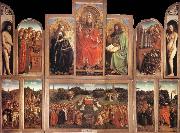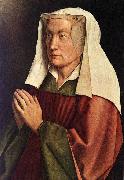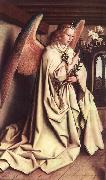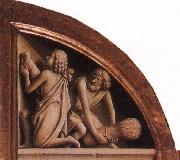Wholesale Oil Painting No Minimum |
|||||||||||
|
|
|||||||||||

|
|||||||||||
|
|
|
||||||||
Jan Van Eyck1395-1441 Flemish Jan Van Eyck Locations Painter and illuminator, brother of Hubert van Eyck. According to a 16th-century Ghent tradition, represented by van Vaernewijck and Lucas d Heere, Jan trained with his brother Hubert. Pietro Summonte assertion (1524) that he began work as an illuminator is supported by the fine technique and small scale of most of Jan works, by manuscript precedents for certain of his motifs, and by his payment in 1439 for initials in a book (untraced) for Philip the Good, Duke of Burgundy. Jan is first documented in The Hague in August 1422 as an established artist with an assistant and the title of Master, working for John III, Count of Holland (John of Bavaria; reg 1419-25), who evidently discovered the artist while he was bishop (1389-1417) of the principality of Liege. Jan became the court official painter and was paid, with a second assistant when the work increased in 1423, continuously, probably until the count death in January 1425. |
||||||||
|
|
||||||||
The Ghent Altarpiece
The Ghent Altarpiece Painting ID:: 44868 |
mk176
1432
tempera and oil on wood
11x7.3in
mk176 1432 tempera and oil on wood 11x7.3in |
|||||||
|
|
||||||||
EYCK, Jan vanFlemish Northern Renaissance Painter, ca.1395-1441 Painter and illuminator, brother of Hubert van Eyck. According to a 16th-century Ghent tradition, represented by van Vaernewijck and Lucas d'Heere, Jan trained with his brother Hubert. Pietro Summonte's assertion (1524) that he began work as an illuminator is supported by the fine technique and small scale of most of Jan's works, by manuscript precedents for certain of his motifs, and by his payment in 1439 for initials in a book (untraced) for Philip the Good, Duke of Burgundy. Jan is first documented in The Hague in August 1422 as an established artist with an assistant and the title of 'Master', working for John III, Count of Holland (John of Bavaria; reg 1419-25), who evidently discovered the artist while he was bishop (1389-1417) of the principality of Liege. |
||||||||
|
|
||||||||
|
|
The Ghent Altarpiece
The Ghent Altarpiece Painting ID:: 64768 |
1432 Oil on wood Cathedral of St Bavo, Ghent The detail shows Isabelle Borluut, wife of Jodocus Vyd, the donor of the Ghent Altarpiece. , EYCK, Jan van , The Ghent Altarpiece: The Donor's Wife (detail) , 1401-1450 , Flemish , painting , portrait 1432 Oil on wood Cathedral of St Bavo, Ghent The detail shows Isabelle Borluut, wife of Jodocus Vyd, the donor of the Ghent Altarpiece. , EYCK, Jan van , The Ghent Altarpiece: The Donor's Wife (detail) , 1401-1450 , Flemish , painting , portrait |
||||||
|
|
||||||||
EYCK, Jan vanFlemish Northern Renaissance Painter, ca.1395-1441 Painter and illuminator, brother of Hubert van Eyck. According to a 16th-century Ghent tradition, represented by van Vaernewijck and Lucas d'Heere, Jan trained with his brother Hubert. Pietro Summonte's assertion (1524) that he began work as an illuminator is supported by the fine technique and small scale of most of Jan's works, by manuscript precedents for certain of his motifs, and by his payment in 1439 for initials in a book (untraced) for Philip the Good, Duke of Burgundy. Jan is first documented in The Hague in August 1422 as an established artist with an assistant and the title of 'Master', working for John III, Count of Holland (John of Bavaria; reg 1419-25), who evidently discovered the artist while he was bishop (1389-1417) of the principality of Liege. |
||||||||
|
|
||||||||
|
|
The Ghent Altarpiece
The Ghent Altarpiece Painting ID:: 64771 |
1432 Oil on wood Cathedral of St Bavo, Ghent When closed, the altarpiece has on the outside of its wings a large Annunciation. , EYCK, Jan van , The Ghent Altarpiece: Angel of the Annunciation , 1401-1450 , Flemish , painting , religious 1432 Oil on wood Cathedral of St Bavo, Ghent When closed, the altarpiece has on the outside of its wings a large Annunciation. , EYCK, Jan van , The Ghent Altarpiece: Angel of the Annunciation , 1401-1450 , Flemish , painting , religious |
||||||
|
|
||||||||
EYCK, Jan vanFlemish Northern Renaissance Painter, ca.1395-1441 Painter and illuminator, brother of Hubert van Eyck. According to a 16th-century Ghent tradition, represented by van Vaernewijck and Lucas d'Heere, Jan trained with his brother Hubert. Pietro Summonte's assertion (1524) that he began work as an illuminator is supported by the fine technique and small scale of most of Jan's works, by manuscript precedents for certain of his motifs, and by his payment in 1439 for initials in a book (untraced) for Philip the Good, Duke of Burgundy. Jan is first documented in The Hague in August 1422 as an established artist with an assistant and the title of 'Master', working for John III, Count of Holland (John of Bavaria; reg 1419-25), who evidently discovered the artist while he was bishop (1389-1417) of the principality of Liege. |
||||||||
|
|
||||||||
|
|
The Ghent Altarpiece
The Ghent Altarpiece Painting ID:: 64772 |
1432 Oil on wood Cathedral of St Bavo, Ghent Prophets Zacharias and Michas are related to the Annunciation through their prophecies given by the text on the floating ribbons. , EYCK, Jan van , The Ghent Altarpiece: Prophet Zacharias , 1401-1450 , Flemish , painting , religious 1432 Oil on wood Cathedral of St Bavo, Ghent Prophets Zacharias and Michas are related to the Annunciation through their prophecies given by the text on the floating ribbons. , EYCK, Jan van , The Ghent Altarpiece: Prophet Zacharias , 1401-1450 , Flemish , painting , religious |
||||||
|
|
||||||||
EYCK, Jan vanFlemish Northern Renaissance Painter, ca.1395-1441 Painter and illuminator, brother of Hubert van Eyck. According to a 16th-century Ghent tradition, represented by van Vaernewijck and Lucas d'Heere, Jan trained with his brother Hubert. Pietro Summonte's assertion (1524) that he began work as an illuminator is supported by the fine technique and small scale of most of Jan's works, by manuscript precedents for certain of his motifs, and by his payment in 1439 for initials in a book (untraced) for Philip the Good, Duke of Burgundy. Jan is first documented in The Hague in August 1422 as an established artist with an assistant and the title of 'Master', working for John III, Count of Holland (John of Bavaria; reg 1419-25), who evidently discovered the artist while he was bishop (1389-1417) of the principality of Liege. |
||||||||
|
|
||||||||
|
|
The Ghent Altarpiece
The Ghent Altarpiece Painting ID:: 64773 |
1425-29 Oil on wood, width 37 cm Cathedral of St Bavo, Ghent The scene at top of the niche containing the figure of Adam depicts in grisaille the Offering of Abel and Cain. The scene prefigures both the sacrifice of Christ and the Eucharist. , EYCK, Jan van , The Ghent Altarpiece: The Offering of Abel and Cain , 1401-1450 , Flemish , painting , religious 1425-29 Oil on wood, width 37 cm Cathedral of St Bavo, Ghent The scene at top of the niche containing the figure of Adam depicts in grisaille the Offering of Abel and Cain. The scene prefigures both the sacrifice of Christ and the Eucharist. , EYCK, Jan van , The Ghent Altarpiece: The Offering of Abel and Cain , 1401-1450 , Flemish , painting , religious |
||||||
|
|
||||||||
|
EYCK, Jan van Flemish Northern Renaissance Painter, ca.1395-1441 Painter and illuminator, brother of Hubert van Eyck. According to a 16th-century Ghent tradition, represented by van Vaernewijck and Lucas d'Heere, Jan trained with his brother Hubert. Pietro Summonte's assertion (1524) that he began work as an illuminator is supported by the fine technique and small scale of most of Jan's works, by manuscript precedents for certain of his motifs, and by his payment in 1439 for initials in a book (untraced) for Philip the Good, Duke of Burgundy. Jan is first documented in The Hague in August 1422 as an established artist with an assistant and the title of 'Master', working for John III, Count of Holland (John of Bavaria; reg 1419-25), who evidently discovered the artist while he was bishop (1389-1417) of the principality of Liege. The Ghent Altarpiece 1425-29 Oil on wood, width 37 cm Cathedral of St Bavo, Ghent The scene at top of the niche containing the figure of Adam depicts in grisaille the Offering of Abel and Cain. The scene prefigures both the sacrifice of Christ and the Eucharist. , EYCK, Jan van , The Ghent Altarpiece: The Offering of Abel and Cain , 1401-1450 , Flemish , painting , religious |
||||||||
|
|
||||||||
|
Prev Next
|
||||||||
|
|
||||||||
|
Related Paintings to EYCK, Jan van :. |
||||||||
|
|
||||||||
|
CONTACT US |





